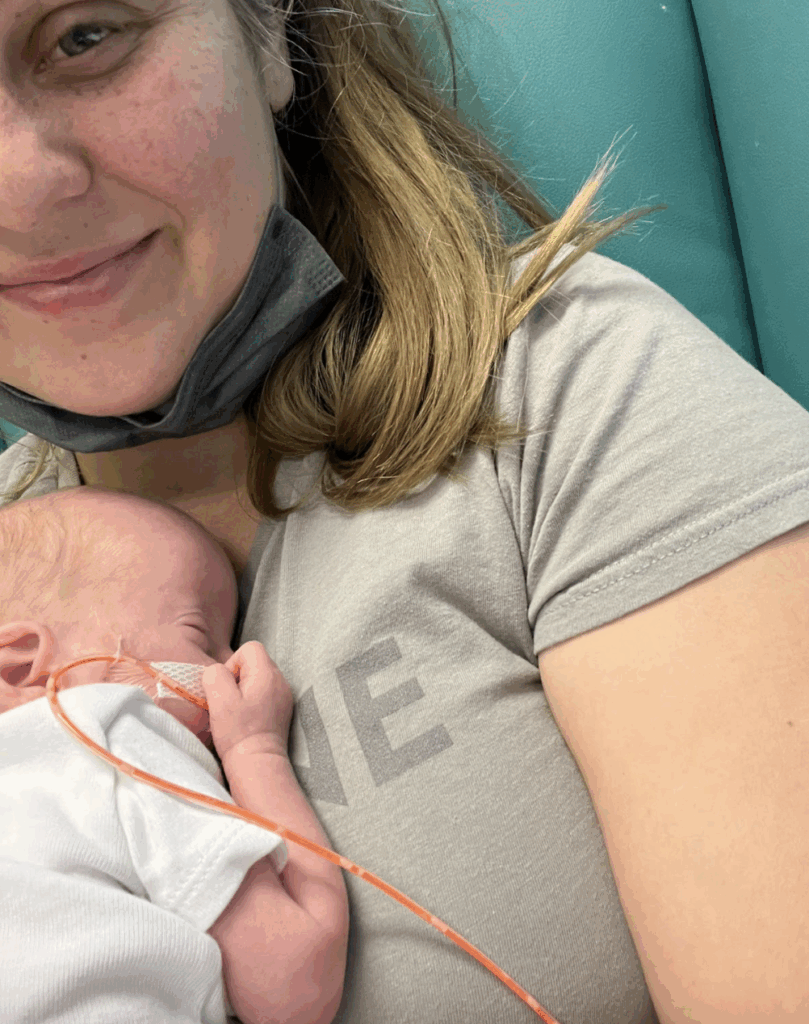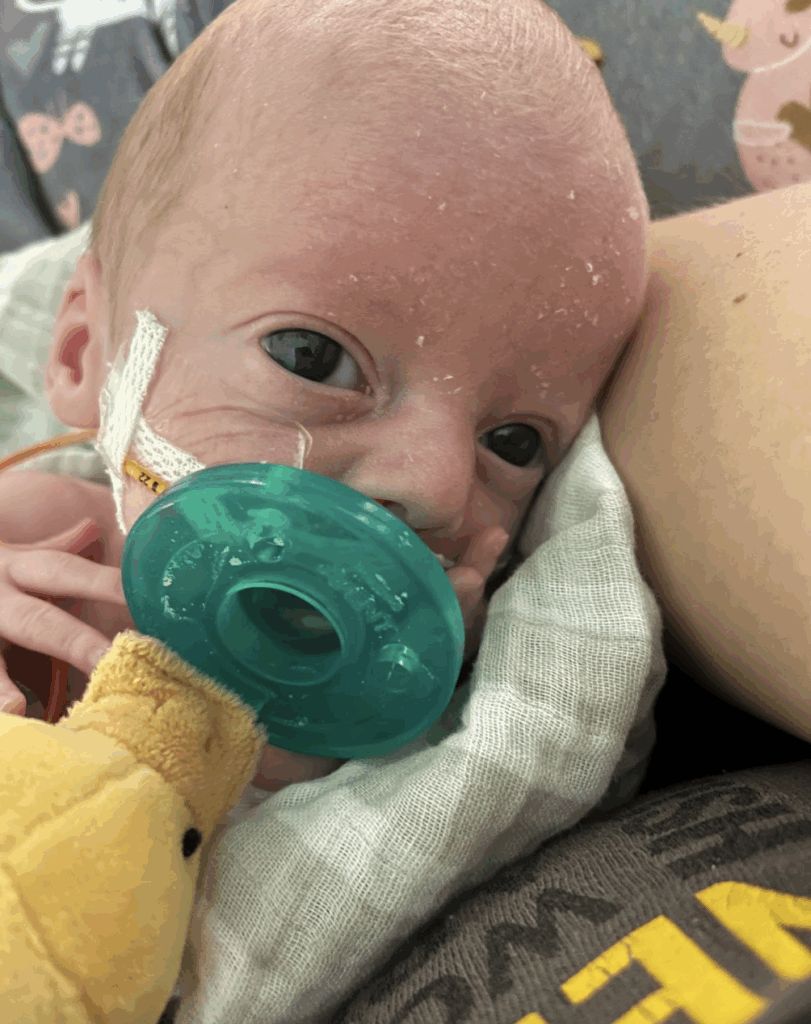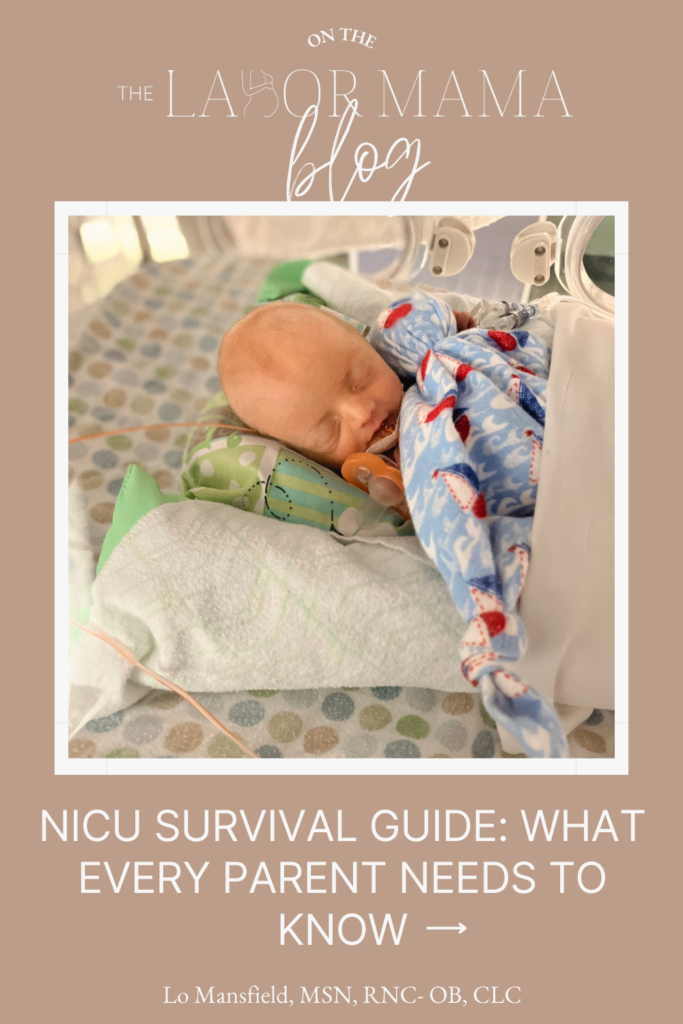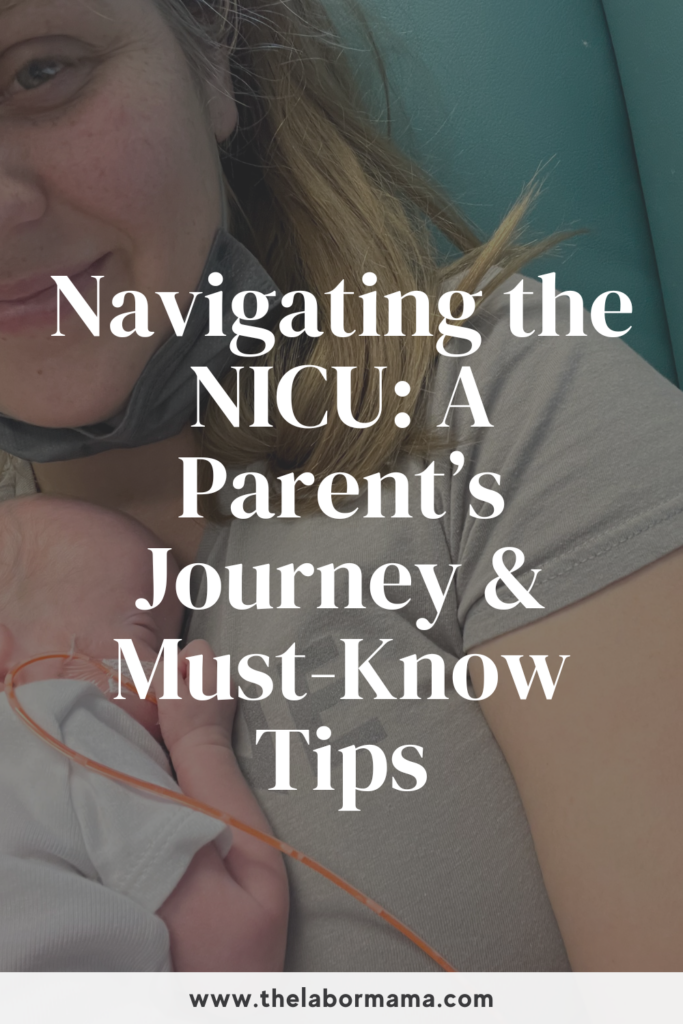If you’re wondering “what is the NICU”, I want you to know—I’ve been there, too. Well, not personally, but I’ve held the hands of friends and patients who have walked through those NICU doors, and I know just how overwhelming it can feel. The questions, the beeping monitors, the waiting… it’s a world you never expect to be part of until suddenly, you are.
One of those friends of mine is Sidnee. She’s a NICU mama (and part of the team here at TLM), and today, she’s sharing her story. She’s been where you might be right now—figuring out what all the medical terms mean, learning how to advocate for her baby, and trying to navigate a reality that looks so different from what she imagined. In this post, she’s going to walk you through her NICU journey, answer some NICU questions, and share the things she wishes she had known.
Whether you’re anticipating a NICU stay, in the NICU right now, just got home, or love someone who’s in the thick of it, this post is for you. Let’s dive in.
Who is The Labor Mama and Why Am I Here?
Hey friend! I’m Lo – also known around here and social media as The Labor Mama. I’ve spent my nursing career in labor, delivery, and postpartum, have birthed 4 of my own babies, have labored thousands of mamas at the bedside, have taught hundreds of students online, and have even delivered a few speedy little babies with my bare hands (oops).
Here at TLM, I offer online classes to empower you the way everyone should be. The education + support I offer gives you experience, evidence, and empathy; you’re getting all of my years of “clinical” RN knowledge, beautifully combined with my real experiences as a mama and a nurse. These are not your average hospital classes (those won’t do it, I promise), and honestly, birth, postpartum, and breastfeeding don’t follow a textbook or protocol anyway. You need to know so much more than that!
If you want to connect with me further, head to Instagram. There are hundreds of thousands of us over there learning together daily.
A note: This post may include affiliate links. This means if you make a purchase after clicking a link, I will earn a small commission (thank you)! Rest assured, this comes at no additional cost to you. You can read TLM’s full disclosure here.
Sidnee’s NICU Story
When I first heard the words “Neonatal Intensive Care Unit,” or NICU, I had no idea how much that place would become part of my story. If you’re wondering what is the NICU, you’re not alone. It’s a question many parents don’t even think to ask—until they find themselves in the world of incubators, monitors, and medical teams working tirelessly to help fragile newborns.
For me, the NICU became a second home after my baby was born eight weeks early and needed extra care. It was a time filled with uncertainty, hope, and a rollercoaster of emotions. I want to share my journey in the NICU, explain what the NICU is, what to expect, and how you can find the resources and support you need to get through this time. While there are so many unknowns when it comes to the NICU, the one thing I do know is that you will get through this.
My Birth Story
Nothing could have prepared me for the moment my pregnancy took an unexpected turn—except for maybe my mom gut. My pregnancy had been progressing well, but something felt off. I even told my sister (who was flying to Africa that morning!) that I had a feeling we would be meeting this baby sooner rather than later.
And I was right.
At my 32-week appointment, I had an ultrasound. Then I heard the words you never want to hear from the ultrasound tech—let me get the doctor.
The doctor came in and told me I had almost no amniotic fluid. It could be one of two things: either I wasn’t drinking enough water (not just a little—zero water), or something was wrong with the baby. Since I knew I was drinking an insane amount of water with excessive trips to the bathroom to prove it, I knew my mom gut was right—something was wrong with my baby.
I immediately went to the hospital, completely unprepared for what was about to happen. First, they pumped me with fluids for 24 hours. When the numbers didn’t improve, I went in for an emergency c-section.
When my baby was born, the room quickly shifted into action. Doctors and nurses moved swiftly, assessing my little one. I barely had a moment to process what was happening before they told me my baby needed to be taken to the NICU for specialized care. My heart sank.
I wasn’t even able to hold my baby. I had no idea what was wrong with him or if he was even going to make it. Just like that, he was taken away. My husband went with him while I lay on the surgery table, feeling like my heart was on the outside of my body, aching in a way I had never experienced before.
After a couple of hours of recovery, I was finally able to go see my boy.
Walking into the NICU for the first time was overwhelming. The sight of tiny babies in incubators, the constant beeping of monitors, and the hushed voices of dedicated nurses—it was all so much to take in. Seeing how tiny he was in an incubator broke me. I couldn’t even touch him without gloves on, and I wouldn’t be able to hold him until 11 days into our NICU stay.
Those first few days felt impossibly hard. My hormones were all over the place, and I felt like I was attached to my pump because it was the only thing I could do for my baby. I didn’t understand the medical terms or what was going on at first because I was too overwhelmed to ask questions. But eventually, we got into a groove. After eight weeks, we were able to go home, and you would never know all the things my son went through to become the thriving little boy he is today.

What Is the NICU?
The Neonatal Intensive Care Unit (NICU) is a specialized unit in hospitals designed for newborns who need extra medical attention. Babies who end up in the NICU may have been born prematurely, have low birth weight, or face complications that require close monitoring.
There are different levels of NICU care:
- Level I: Basic newborn care for healthy, full-term babies needing minimal support.
- Level II: Intermediate care for babies who need more monitoring, oxygen support, or help with feeding.
- Level III: Specialized care for critically ill or premature babies who require respiratory support, surgery, or other intensive treatments.
- Level IV: The highest level of neonatal care, often in large hospitals with advanced surgical and life-saving interventions.
No matter the level of care, every NICU has a team of neonatologists (a doctor who specializes in newborn babies), nurses, respiratory therapists, and lactation consultants dedicated to helping these tiny patients grow stronger every day.
*When you’re choosing a hospital/provider, you can look into the level of NICU care that will be available at the hospital! Though you don’t have to, you can use this as part of the way you decide who will deliver your baby and where.
What to Expect in the NICU
Hearing that your baby needs NICU care can be overwhelming. The environment is filled with beeping monitors, incubators, and medical staff moving quickly. Here’s what you can expect:
- The First 24 Hours: Doctors and nurses will assess your baby’s condition, place necessary medical support like IVs or feeding tubes, and monitor vitals closely. There’s a very good chance your baby will need donor milk, and mama, that is 100% okay. Just keep pumping if that’s what you choose to do.
- Daily Routine: Depending on your baby’s needs, they may be in an incubator, receive oxygen support, or need a feeding plan tailored to their condition.
- Parent Involvement: While it can feel intimidating, parents are encouraged to be involved in their baby’s care, and I’m serious when I say DO IT. Skin-to-skin contact (Kangaroo Care), changing diapers, and feeding when possible all can help with bonding and as a mom it makes you feel like you’re doing something when a lot of times you may feel helpless.
- Milestones & Challenges: Every NICU journey is unique. Some days bring progress, while others bring setbacks. I experienced plenty of both. It’s important to celebrate the small wins and lean on the medical team for support and guidance with the setbacks.
Resources & Support for NICU Parents
Being a NICU parent is emotionally and physically draining, but there are resources available to help:
- Hospital Support: Many NICUs have social workers, lactation consultants, and chaplains to offer assistance. Utilize them if you need them! They are there to help you, especially the lactation consultants. I had no idea I needed a different size flange for my pump and since I was using it so often, it made such a world of difference once a lactation consultant helped me figure this out.
- A note from Lo: Most of my patients with NICU babies wanted and needed lots of feeding/pumping support. If it is not readily available to you, ask, ask, ask. If you want to breastfeed, what you do in those first hours and days matters, so get the help you need to get off to the best start you’re able to, either straight away or as soon as your situation and emotions allow for it. I really loved helping mamas get this part figured out when baby needed some extra TLC, so I know there are nurses and LC’s who should be there for you too if needed.
- Financial Aid: Programs like Medicaid, SSI for preemies, and hospital financial assistance can help with medical costs. And that’s what they are created for, so do not feel bad if you need to utilize these programs.
- Parent Support Groups: Connecting with other NICU parents through online forums or local groups can make a big difference. Even leaving your baby for 30 minutes and going to get lunch in the parent’s room or cafeteria can be so helpful.
- Books & Websites: Organizations like March of Dimes and Hand to Hold offer valuable NICU education and support.
Advice for NICU Parents
If you’re currently navigating the NICU, here are a few things I wish I had known:
- Advocate for Your Baby: Ask questions, take notes, and don’t be afraid to request explanations from the medical team. If you do best with pictures, ask them to draw you pictures. While the doctors and nurses are incredible, at the end of the day you are still your baby’s mom.
- A note from Lo: Truly, NO question is stupid. If you want to know – ask! You have every right to know what is going on with your child and it is our job to communicate all you want and need to know.
- Take Care of Yourself: Eating, resting, and leaning on your support system will help you be there for your baby.
- Celebrate Every Win: No matter how small—whether it’s gaining weight, moving off oxygen, or simply a quiet, stable day—every step forward is a victory. I have a NICU journal where I wrote down all of my son’s stats and one win for the day.

To wrap up this post about the NICU…
Sidnee’s story is just one of so many NICU journeys, each one filled with its own challenges, victories, and moments of strength.
If you’re walking through the NICU journey right now, Sid and I both want to say—you are not alone. We know this experience is filled with so many emotions, from fear and exhaustion to moments of pure joy as your baby grows stronger. It’s okay to feel overwhelmed, to ask a million questions, and to take things one day at a time.
And if you ever need a reminder that you can do this—just know that there’s a whole community here, cheering for you and your baby every step of the way.
If you’ve been through the NICU, we’d love to hear your story, too. Every experience is different, but sharing can help another parent feel a little less alone.
If you feel comfortable, drop a comment below and share your NICU journey. What helped you the most? What do you wish you had known? Let’s create a space where NICU parents can support and encourage one another.
Xx- Lo
Loved this blog post? Here’s some others you’ll probably like:
- Understanding The Newborn Stomach & How It Changes
- Newborn Must-Haves: 13 Items My Family Has Loved
- The Best Postpartum Pajamas: All My Favorites
More resources (and freebies!) for you to take a peek at:
- Comprehensive Birth Plan and Birth Priorities templates
- A complete Third Trimester Checklist
- The RN + mama of 4 Ultimate Packing List
- The Labor Mama online birth, baby and breastfeeding classes for every family
Loved this post? Don’t forget to Pin it for later!






